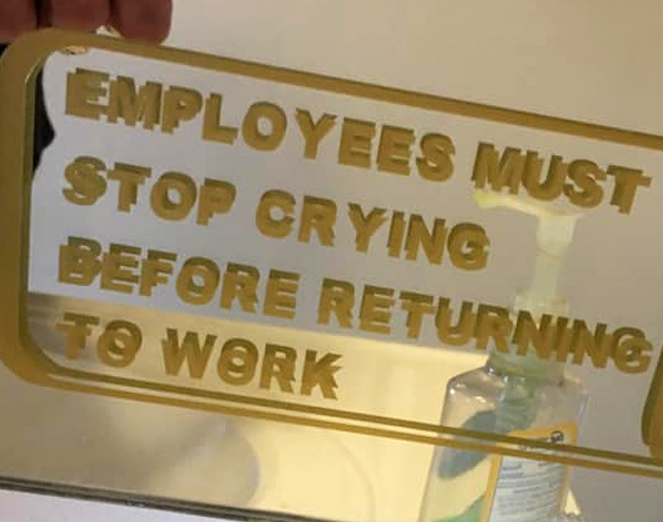

They pay the business who owns the ad space, who in turns pays the website or app for their space. You pay for the app or website content by watching the ad.
It’s a terrible model, but you are being paid (in content) for watching ads.


They pay the business who owns the ad space, who in turns pays the website or app for their space. You pay for the app or website content by watching the ad.
It’s a terrible model, but you are being paid (in content) for watching ads.
This actually happens very frequently in the US. When hunters harvest a bird they report their kills in compliance with hunting regulations. If any of your birds have leg or neck bands you report that information as well. The bands have a tracking number on them, and scientists use them to monitor populations and migration patterns. It’s literally part of their plan.
You get to keep the bands as well (I only have experience with banded geese and ducks). They’re a neat memento.


You must have me confused with someone else?
Nowhere in this thread did I suggest people find cheaper housing by leaving cities.


How do I plan for job instability? By interviewing at many places continuously. By keeping my job skills and interviewing skills sharp, while interviewing continuously. By keeping my eye on the market and my value, by interviewing continuously, and evaluating the incoming offers.
It’s not easy, but it’s pretty straightforward. I picked a job sector with lots of opportunities and upward mobility, but also tons of instability. I picked a place to live which gives me physical proximity to those opportunities. I work smart and stay agile. All of that without a college degree.
Stuff is expensive and we don’t always have everything we want, but we’re secure enough to have everything we need, with a healthy risk management plan.
I do live in a major city in the US, so I have more local opportunities than someone in a small town. But I’d argue that my decision to live near where there are job opportunities was part of my planning process.


I mean, yeah, I plan for that. If you’re a wage earner like me, you should know you’re employed at the will of some company, and they don’t give a shit about you.
I plan for this by interviewing for other jobs at least once a month. I turn down offers every few months. I keep my skills sharp and my eyes open, and change employment when it makes sense.
The longest I’ve been at one company is 7 years, but it’s not unusual for me to change companies after 18-24 months.
I don’t plan to get laid off, but it happens a lot in my industry, and I roll with it. It is planned out, risk management, or whatever you want to call it.


So the economy made it so people who were planning ahead suddenly woke up one day with an unplanned 2 year old?
Sure, money and housing are tougher than they used to be, but don’t pretend like an embarrassing number of people just don’t care to plan ahead, and when they get into deep shit they look to blame everyone else.


Huh, it’s like planning ahead isn’t even a thing.
Once the kid situation hits then yeah, it’s harder to make planning decisions, people’s options are limited at that point. I agree we should help people in those circumstances, but I also think we should help people make plans which avoid painting themselves into a corner.
Tmux with a few custom key bindings is amazing. Kind of a learning curve, but not nearly as bad as something like Vim.


I see a lot of references to Ubuntu being filled with ads or scaring people into buying their services, but I’ve been daily driving it for over 15 years on personal desktops and servers and never noticed that. What have I missed?
I never saw the Amazon ad stuff, I hear it was a referral link?
Last I checked Ubuntu Pro is free for personal use on up to 5 machines.
I use apt to manage all my packages and upgrades, including dist-upgrade, maybe that’s why I’ve never noticed snap? Why does snap suck?


False.
Section 3, article 3: SPEAKERS IN HELMETS
The Coach-to-Player system allows a member of the coaching staff in the bench area or the coaches’ booth to communicate to a designated offensive or defensive player with a speaker in his helmet. The communication begins once a game official has signaled a down to be over and is cut off when the play clock reaches 15 seconds or the ball is snapped, whichever occurs first.


The headsets are active between plays, and have one way communication with one player on each side. Typically this is the quarterback on offense and a team captain/play caller on defense. These players wear special helmets typically marked with a green dot on the back.
The refs or other officials cut off communication when the play clock reaches 15 seconds, preventing the kind of real-time communication you suggest.


6’3" 200lbs is about right for a fit male. I imagine her muscularity plus future stuff like diet and augmentation would make that realistic for a female.


I’m not saying it’s a safe idea, getting caught is expensive.
What’re your chances of getting caught if you fly out in the middle of a national forest, hours from the nearest highway? Honest question, I’m not aware of how this is enforced.
A counterpoint would be hunting without a proper tag (poaching) I hunt in the middle of nowhere fairly regularly, but I encounter game wardens at least once a season, so enforcement in my area is pretty good.


Noncompliance is also a way to go, just a thought.


You cannot introduce a human structure to manage water more efficiently than nature
If you actually believe this then there’s nothing anyone can say to help you.
If a naturally occuring spring runs directly into a wide flat area in the middle of the Mojave desert, then it doesn’t naturally reabsorb into the ground as the hard pack just makes it sit on the surface. Since the water is shallow and sitting on the surface, it evaporates instead of being used to water native plants or support native animals.
The golf course in question is not a dam, it’s putting the already available water to use more efficiently. Growing non-native grass, but also native plant species, and providing native insects and animals a way to utilize that water before it would have otherwise evaporated.
Dams destroy native ecosystems by flooding and displacing them, or removing available water downstream. The golf course in question does none of those things.
“Nature is perfect and humans are capable of nothing but destroying it” is a great take BTW. You could have saved a few people some time by leading with that.


You must be trolling.
Birds, insects, and reptiles are common even in the desert. A species can be native to an ecosystem or region, without naturally occuring in an small locality.
If humans manage water more efficiently than nature would have in this locality, it stands to reason that the resulting local ecosystem would be able to attract and support more native wildlife.
This is observable and provable for golf courses which manage their resources with a focus on limiting their natural resource use and increasing local biodiversity.
You just hate golf courses, which is fine, but you sound pretty uninformed.


waspy
President Biden is Catholic, not Protestant


Golf courses aren’t just grass, they plant all sorts of other vegetation, much of it native. This supports native wildlife that wouldn’t otherwise be there.
Have you ever actually been to a responsibly managed golf course? Many in the southwest US are run this way, and tons more are moving in that direction to reduce water use.


If you’re visiting a country that doesn’t have enough grass to sustain pissing on a tree, you’re going to the wrong places for golf.
I’m not sure I understand? Did you mean county?
It sounds like this course is located at a natural oasis fed by a natural spring. If the course wasn’t there the water would probably feed some plant life and a bit of wildlife. With proper management it’s likely that their water use is more efficient than it would have been naturally. It isn’t unusual for resource aware golf courses to actually improve biodiversity in a region while being water consumption neutral.
In think you hit the nail on the head for me with this one:
I’m in the same boat. Many of Kamala’s policies aren’t things I want or agree with. Many of Trump’s policies aren’t things I want or agree with. I disagree with BOTH of the major candidates so much that it doesn’t make sense for me to vote for either of them.
They aren’t losing my vote, their platforms are such that neither ever had my vote to begin with. It’s not like my vote would have been for Kamala, but since I have a small issue with one of her planks, then I’m throwing a fit and I’m going to vote 3rd party.
Neither major candidate deserves my vote, In fact I think the difference between Kamala and Trump winning is relatively small for the US. Either of them winning will be a nightmare for the US. They’re both terrible people, they may lie about different things, and the media favors one or the other more for their own benefit. They’re both authoritarian warmongers, who say whatever it takes on the campaign trail to get elected, then stomp all over regular people when they get into power. The major parties are not the same, but they’re both fucked.
I also happen to live in a state where one party will get double the other party’s votes, and it’s been that way for nearly my entire life. MY VOTE FOR PRESIDENT LITERALLY DOESN’T MATTER HERE, EVEN IF I LIKED ONE OF THE MAJOR CANDIDATES.
If other people like Kamala more than Trump, enough to cast their vote for her, then I encourage them to do so. I understand in swing states where individual votes aren’t annihilated by a supermajority that people may have to be more strategic in their voting and take the bad with the good.
But personally, I vote for a 3rd party candidate with no chance to win, whose platform I happen to agree with more than any other candidate, and I can live with myself and the eventual outcome.
I definitely agree on getting out of first past the post though.